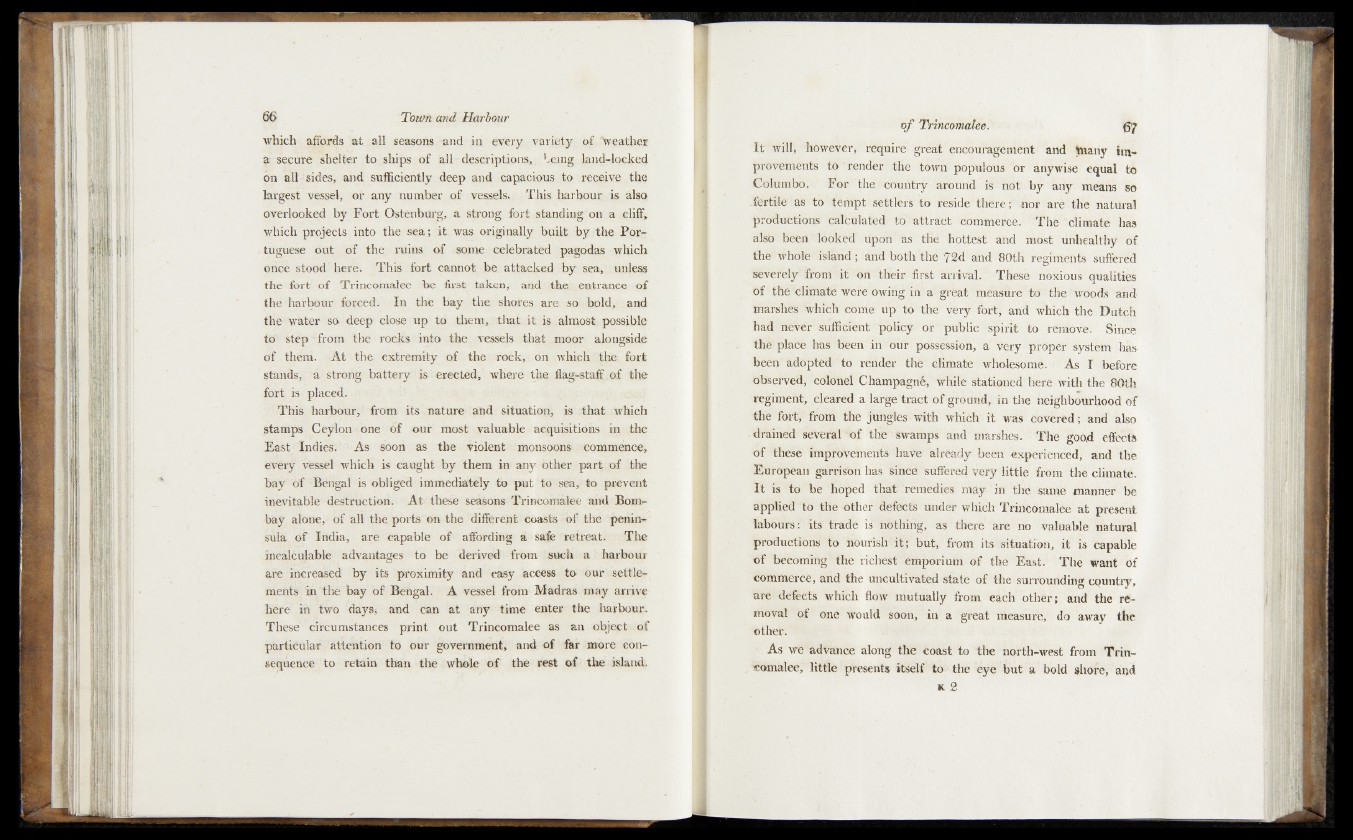
which affords at all seasons ànd in every variety of Veathev
$ secure shelter to ships. of all - descriptions,. bemg fand-foched
on all -sides, and sufficiently deep and capacious to receive the
largest vessel, or any number of vessels. This harbour is also
overlooked by Fort Gstenburg, a strong fort standing on à cliff*
which projects into the sea; it was originally built by/the Portuguese
out of the ruins of some celebrated pagodas which
Oiioe stood Kerb. This fort cannot be: attacked by sea, unless
the fort of Trincomalee be first taken, and: thfâ^eBtraneeo f
thë harbour“ forced. In the bay th e stefes, a re isb bold, and
ttie' water so deep close up to them, that it is almost possible
to step 'from the rocks into the vessels that moor alongside
of them. -At;the. extremity o f the rock, on whfoh “tbfè fort
Stands, a strong battery is erected, where the flag-staff of the
fort is placed. :
This harbour, from its nature ahd situation, is th a t which
stamps Ceylon • one of our most valuable acquisitions in the
East Indies'. As soon as the violent monsoons commence,
ëVérÿ vessel which is caught by them in any other part of the
bay of -Bengal is obliged immediately to put to séan te prevent
inevitable destruction. At these season» Trincomalee and Bomr
bay alone, of all the ports on the different coasts of the peninsula
of India, are capable of affording a safe "retreat. The
incalculable, advantages to be derived from such a harbour
are increased by its proximity and easy access to our settle*,
nàents sn the bay of Bengal. A vessel from Madras may arrive
hère in two days* and can at any time enter the harbour.
These- circumstances print out Trincomalee as an object of
particular attention to our government, and of far more consequence
to retain than the whole o f the rest of the island:.
o f Trincorficdee. 67
I t will, however, require great encoui'agenient and fnany improvements
to "’vender the town popUloflshbr anywise equal t6
Golumbo. Fo&■ tfae'/tfcbfofitry éfbund is!* not by aiiy moans so
fertile! as to tempt * Settlers to' ïëstfdè^hiré p . nor arè thé natural
productions Calculated to'1'attract '(^in^aêteè.^The 'climate has
alsb been 'tóüked Upoh^is the hotted and most unhealthy 1 of
the whole'-rslaind ; and both thé fom e n ts suffered
Sèvetely Trom it- on 'their first arrival. 1 ’ 'These nojUousTqualities
6f the Climate were' owing in' a ^ r ë a t' 'mèdsllre' to" ’ tie *wdods ahd
marshes 'which Cbme- up to’ the very fort! and- which the Dutch
had never Sufficient policy or"! public" spirit to remove. Sincb
the* ptaCe has 'been in 1 o‘ur possession, a Very-proper System has
been adopted-'1 to render the efenate wholesome, >"As I before
Observed, colonel Champagné, while stationed here with the 80th
regiment, cleared a large tract of gfodnd, in the héighbourhóod of
the fort, from the jungles with which it was Covered; and also
drained several‘•of th é ' swamps and marshes. - The good effects
of these imprbVements h a te already been èxperiended* and the
European gatiufon has Sincésuferedvery little from the climate.
I t is to be hoped that Remedies may in thé same manner be
applied to the other defocts under whibh Trincomalee a t present
labours : its trade is nothing, as there are no valuable natural
ItfoduCtiOnS to höurMBit; but, fooni its Sltuatfon, dt is capable
of becoming‘ the richest emporium of the East. The want of
Commerce, and the uncultivated state of the surrounding country,
are defects Whifch flow mutually from each oth ër; and the removal
of one Would soon, in a great measure, do away the
other.
' As we advance along the coast to th e north-west from Trin-
comalee, little presents itself to the eye but a bold shore, and
k 2